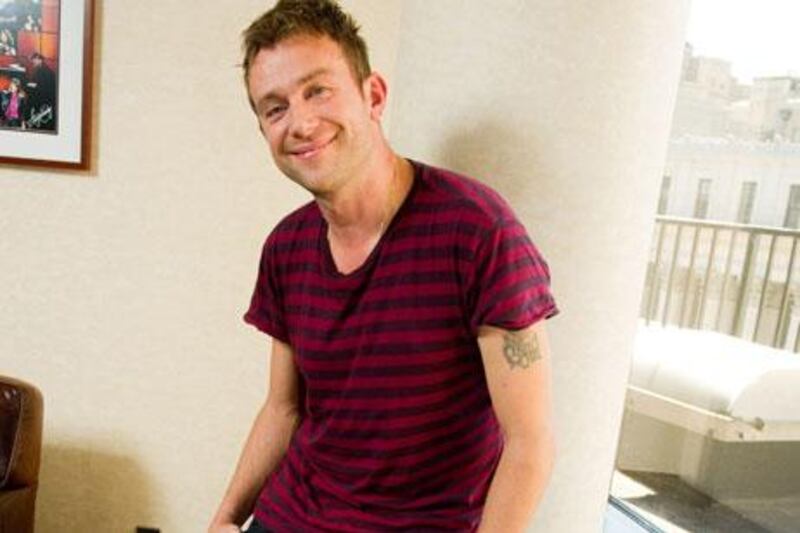On a warm October night in London’s shabby district of Hackney, a makeshift concert is unfolding in the back room of a packed charity shop. The sound system plays a sloppy mash-up of techno and reggae, sampled African voices and shuddering machine beats.
Music: The National listens
Music reviews, festivals and all things sound related
[ Music ]
The tiny stage is crowded with electronic instruments and bobbing heads. One of them, lurking stage left, belongs to Damon Albarn, of Blur and Gorillaz fame.
For a multitasking pop polymath accustomed to headlining huge arenas and rock festivals, this low-key gathering must represent the smallest crowd the singer has played to in 20 years. But Albarn the superstar is off duty tonight. Arriving unbilled with zero fanfare, he shuts his eyes and sways gently to the warm, sinewy rhythms.
Welcome to the low-key launch party for Kinshasa One Two by Albarn's new globalised Afro-techno collective DRC Music, a free-form collaboration between 11 electronic music producers, mostly from London, with an army of musicians from one of Africa's largest and poorest countries, the Democratic Republic of the Congo. A charity benefit project for Oxfam, the album is released this week on the London-based electronic label Warp.
A very 21st-century exercise in two-way cultural traffic, DRC Music is just the latest example of left-field musicians and record labels from Europe and the US increasingly looking to Africa for inspiration. This reflects growing interest in the new sounds that have emerged over the past decade out of countries from Kenya to Nigeria and cities from Dakar to Durban, as cheap recording technology and online file-sharing have helped turn electronic music into a shared global language. Modern Africa is no longer a dusty museum of rootsy “world music” but an Afro-futurist hothouse of multilingual electronica.
Named after the DRC capital where it was recorded over five days in July, Kinshasa One Two has an agreeably raw and unpolished feel, but with the high-tech urban pulse of contemporary electronic music: laptop meets junk-shop. Albarn himself croons the sleepy duet Hallo with the Congolese stars Nelly Liyemge and Tout Puissant Mukalo, but mostly plays a backstage role, wary of being seen as just another western pop star plundering Africa's cultural riches.
“I don’t see myself as a pop star, I see myself as a proper musician,” he says. “I don’t play many notes, but I do play with my heart.”
In fairness, Albarn has been working on African fusion projects for a decade, since Oxfam first encouraged him to record his Mali Music album in Bamako in 2002. He subsequently launched his series of "Africa Express" collaborative concerts and has visited the continent many times to work with Algerian orchestras, Nigerian drummers, Malian crooners and more.
Oxfam suggested the DRC for the project, partly because this war-torn former Belgian colony at the heart of Africa is such a troubled country, but also because it is rich musically. Most recently it spawned the funky hybrid genre known as "Congotronics", spearheaded by the globally acclaimed group Konono No 1. The Congotronics aesthetic is based on cheap, homemade instruments customised to mimic the sound of drum machines, keyboards and samplers. The former Gorillaz member Remi Kabaka, one of the London producers on the Kinshasa One Two album, coined the term "Tupperware techno" to describe this innovative, recycling subculture.
“There is a massive intermediate technology thing out there, which is necessary, and probably part of all of our futures,” Kabaka argues. “It is this intoxicating mix of relentless invention and huge creative, economic and political restrictions which allows them to come up with new sounds through necessity.”
The first wave of African electronic music to make waves on the world stage was South African "kwaito", a slowed-down cousin of American house music incorporating elements of jazz, hip-hop and slang-heavy lyrics in several languages. Emerging in the mid-1990s, the genre reached a new global audience when the DJ Mujava released his 2008 album Township Funk on Warp, the same UK label as DRC Music.
But the most hotly tipped breakout star of South Africa's post-kwaito scene is Spoek Mathambo, who last year released a dazzling Afro-futurist remake of the Joy Division song Control, backed by an award-winning video.
Mathambo recently signed to the cult US label Sub Pop, once home to Nirvana, and is currently working on his second album with collaborators from all across the world. He playfully describes his sound as “township tech”, but in truth he is wary of reductive tribal or geographical labels.
“Distance between us all as points in space has become close to nil due to technology,” Mathambo argues. “So sound can be heard as sound without putting people in ghettos due to their location or backgrounds. My influences stretch to all points of the universe – well, as far as my mind and imagination have travelled. I try to make music of 2012, something of the future that has never existed before.”
Recently a new Soweto-based club music genre has emerged in Johannesburg. Shangaan electro combines frenetic rhythms of around 180 beats per minute with marimbas, distorted vocal samples, colourful costumes and hyperkinetic dance routines.
Alert to new developments on the Afro-techno underground, Albarn has already released a Shangaan compilation on his London-based record label, Honest Jon’s, and is working on a collaboration with Mathambo, too. For the Blur frontman, African music is clearly a gift that keeps on giving.
“Going to Africa, the inspiration is just everywhere in the ether,” Albarn says. “Some aspects of it are mind-numbingly depressing, but other aspects are so inspirational that they look like the future.”
Kinshasa One Two by DRC Music is released this week on Warp
Follow us on Twitter and keep up to date with the latest in arts and lifestyle news at twitter.com/LifeNationalUAE










